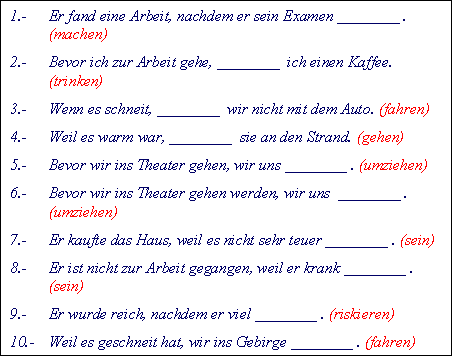Consecutio Temporum
Each sentence has a main tense. The other tenses in the sentence are used in conjunction with the main tense.
In German, there are a few rules with regards to the "consecutio temporum", but in reality, they don't stick too rigidly to these rules. On the contrary, in German, the "consecutio temporum" is quite free.
Use of tenses in subordinate clauses
Now we are going to explain the most common uses of the tenses in subordinate clauses. Students should be aware that there are more possibilities than those shown here.
This area will be expanded on in the next course.
a) Gleichzeitigkeit (simultaneous events)
Normally the main clause and the subordinate clause go in the same tense.
| Wir essen heute nicht draußen, weil es kalt ist. (presente) |
| Today we're not going to eat out because it's cold. |
| - |
| Wir aßen nicht draußen, weil es kalt war. (préterito) |
| We didn't eat out because it was cold |
| - |
| Wir haben nicht draußen gegessen, weil es kalt gewesen ist. (perfecto) |
| We haven't eaten out because it has been cold |
b) Vorzeitigkeit (to describe previous events)
b.1.- Present + perfect
| Ich bin schlanker, nachdem ich eine Diät gemacht habe. |
| I'm thinner since I have been on the diet. |
b.2.- Perfect + past perfect
| Er ist reich gewesen, weil er viel gearbeitet hatte. |
| He got rich because he had worked a lot. |
b.3.- Past simple + past perfect
| Er war reich, weil er viel gearbeitet hatte. |
| He was rich because he had worked a lot |
c) Nachzeitigkeit (to describe events that happen afterwards)
We are going to distinguish between:
c.1.- Events that happen afterwards with a past reference:
Past simple + past perfect
| Bevor wir nach hause gingen, hatten wir ein Bier getrunken. |
| Before we go home we will have had a beer. |
c.2.- Events that happen before another event and which have future reference
Present + present
| Bevor wir nach hause gehen, trinken wir ein Bier. |
Futur I + present
| Bevor wir nach hause gehen werden, trinken wir ein Bier. |
Perfect + Futur I
| Bevor wir nach hause gegen, weden wir ein Bier trinken |
These three examples can be translated as:
| Before we go home, we'll have a beer |
---------------- oooo O oooo ----------------
Exercises
Fill in the gaps using the verb in brackets in its correct form.
(Click on the box to see the answers; double click to return to the original position)


